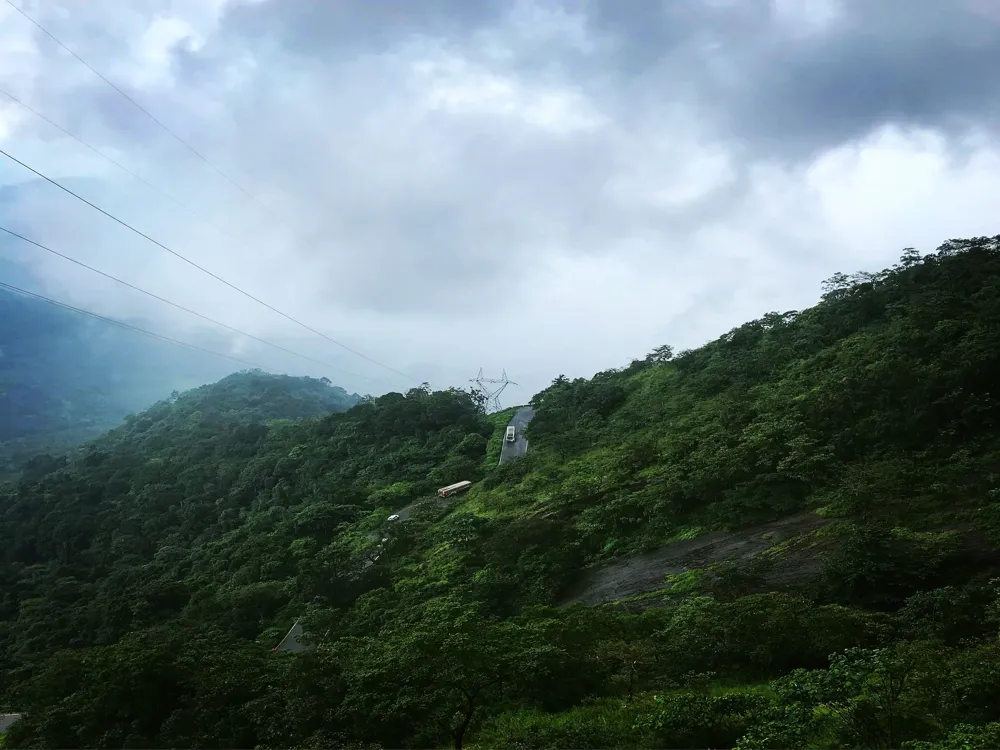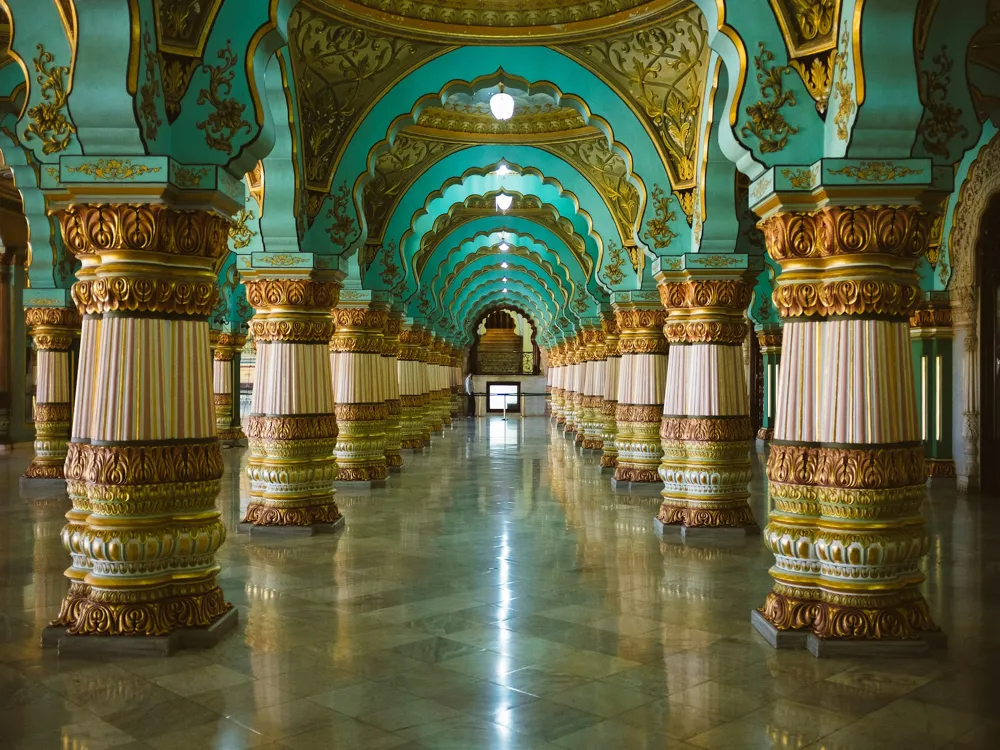Nestled in the historic city of Hassan, Karnataka, the Hasanamba Temple is a revered and enigmatic shrine, steeped in legend and tradition. This ancient temple, dating back to the 12th century, stands as a testament to the rich cultural and religious heritage of India. The temple is dedicated to Goddess Hasanamba, an incarnation of Shakti, symbolizing the divine feminine energy. Uniquely, the temple opens its doors to devotees only once a year during the auspicious period of Ashwayuja month (October-November), adding to its mystique and allure. The legend of Hasanamba is as fascinating as the temple itself. It is believed that the Goddess Hasanamba will protect the town of Hassan and its people until her next annual awakening. The temple's history is intertwined with several myths and local folklore, making it a captivating destination for both pilgrims and history enthusiasts. The temple not only serves as a place of worship but also as a beacon of the age-old traditions and spiritual ethos of the region. Visiting the Hasanamba Temple is a unique experience. Devotees and tourists alike are drawn to its mysterious charm, and the annual opening of the temple creates an atmosphere of heightened spirituality and devotion. The temple's architecture, which we will delve into in more detail, reflects the artistic and cultural influences of the Hoysala and Vijayanagara empires, showcasing intricate carvings and historical significance. This blend of myth, architecture, and tradition makes Hasanamba Temple a must-visit destination in Karnataka. The Hasanamba Temple of Hassan, Karnataka, is a masterpiece of ancient Indian architecture, reflecting the style and craftsmanship of the Hoysala and Vijayanagara periods. The temple's design is a harmonious blend of intricate carvings, detailed sculptures, and well-proportioned structures that speak volumes about the skills of the artisans of the bygone era. Its architectural splendor not only serves as a place of worship but also as a canvas that narrates the rich cultural history of Karnataka. The main sanctum of the temple houses the deity of Goddess Hasanamba, portrayed in a rare and unique form. Unlike other temples where deities are carved in stone or metal, the idol here is an anthill, symbolizing a living goddess, covered in flowers, turmeric, and kumkum. This representation of the goddess is highly revered and is believed to embody the raw, natural energy of the Earth. The sanctum itself is an example of architectural brilliance, with its low-lit chamber creating an aura of mystique around the deity. The temple's outer structure is adorned with a series of intricate carvings that depict stories from Hindu mythology, along with floral and geometric patterns. The pillars and walls of the temple exhibit the finesse of Hoysala architecture, known for its detailed and ornate workmanship. The Vijayanagara influence is evident in the temple's expansive courtyards and towering gopuram (gateway tower), which adds to the grandeur of the temple. Each element of the temple, from the entrance to the inner sanctum, is a testament to the architectural heritage and the artistic prowess of the past. The overall design of the Hasanamba Temple is not just about religious significance; it's a blend of art, culture, and engineering. The temple layout is designed in such a way that it aligns with the principles of Vastu Shastra, the ancient Indian science of architecture and space. This alignment is believed to enhance the spiritual energy of the temple, making it a powerful center for devotion and meditation. The temple's architecture thus plays a crucial role in its spiritual aura, drawing devotees and art enthusiasts alike to witness its timeless beauty. The Hasanamba Temple is unique in its operation, as it only opens once a year during the Ashwayuja month. Visitors must plan their trip accordingly. The temple usually remains open for about a week during this period. Check the exact dates beforehand to ensure your visit coincides with the temple opening. Visitors are advised to dress modestly in traditional attire, respecting the sanctity of the temple. It's recommended to avoid wearing shorts, sleeveless tops, or any revealing clothes. Additionally, maintaining a quiet and respectful demeanor within the temple premises is expected. Photography may be restricted in certain areas of the temple. Always ask for permission before taking photos, especially inside the temple or of the deity. Be mindful of the temple's guidelines regarding photography to avoid any inconvenience. As Hassan is a small town, accommodation options might be limited, especially during the temple's annual opening. It's advisable to book your stay well in advance. There are several hotels and guest houses in Hassan that cater to different budgets. The Hasanamba Temple is deeply rooted in local customs and traditions. Participating in the rituals and understanding the customs can enrich your visit. Engage with local guides or priests to learn about the temple's history and rituals. Reaching Hasanamba Temple in Hassan, Karnataka is convenient as the town is well-connected by various modes of transport. Hassan is approximately 185 kilometers from Bangalore, the state capital, and can be reached by road, rail, or air. By Road: Hassan is well-connected by road to major cities like Bangalore, Mysore, and Mangalore. Regular bus services, including luxury and state buses, ply to Hassan. Alternatively, visitors can opt for taxis or self-drive cars for a more comfortable journey. By Rail: Hassan Railway Station is the nearest railhead, connecting the town to various parts of Karnataka and other states. Trains are a convenient option, and the railway station is just a few kilometers from the temple. By Air: The nearest airport is in Bangalore, from where one can take a bus or hire a taxi to Hassan. The drive from Bangalore to Hassan offers scenic views and a glimpse of the rural landscape of Karnataka. Read More:Overview of Hasanamba Temple, Hassan, Karnataka
Architecture of Hasanamba Temple
Tips When Visiting Hasanamba Temple
Understanding the Temple Timings and Schedule
Dress Code and Etiquette
Photography Restrictions
Accommodation and Facilities
Local Customs and Traditions
How To Reach Hasanamba Temple
Hasanamba Temple
Hassan
Karnataka
NaN onwards
View hassan Packages
Weather :
Tags : Temple
Timings : 7:00 AM - 10:00 PM
Planning a Trip? Ask Your Question
Hassan Travel Packages
View All Packages For Hassan
Top Hotel Collections for Hassan

Private Pool

Luxury Hotels

5-Star Hotels

Pet Friendly
Top Hotels Near Hassan
Other Top Ranking Places In Hassan
View All Places To Visit In hassan
View hassan Packages
Weather :
Tags : Temple
Timings : 7:00 AM - 10:00 PM
Planning a Trip? Ask Your Question
Hassan Travel Packages
View All Packages For Hassan
Top Hotel Collections for Hassan

Private Pool

Luxury Hotels

5-Star Hotels

Pet Friendly






















